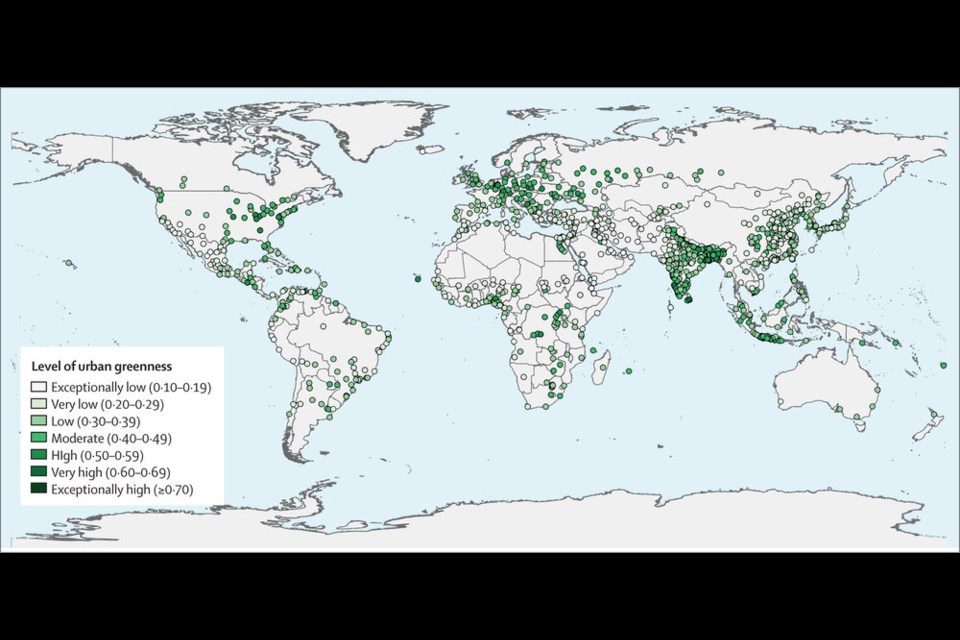A landmark study from The Lancet warns the world is at a 'critical juncture' as it reels under a deadly confluence of heat, flooding, drought, disease, war and a cost-of-living crisis.
Stefan Labbé

Level of urban greenness in urban centres with more than 500,000 inhabitants in 2021. The normalized difference vegetation index (NDVI) is a population-weighted metric measuring urban greenness.2022 Lancet Countdown on health and climate change
A major report tracking how climate change is affecting human health has found humanity’s failure to wean the planet off fossil fuels is putting the health of “all people alive” at risk.
The peer-reviewed Lancet Countdown on health and climate change involved dozens of authors tracing climate’s footprint across 86 countries. They warned the world is facing a confluence of shocks — from the COVID-19 pandemic to Russia’s invasion of Ukraine, to a global-energy-and cost-of-living crisis — which, together with unabated climate change, is affecting “the foundations of human health.”
“The data shows that no country is safe,” said the report.
Over the last year, it pointed to devastating floods across every populated continent on Earth, which cumulatively killed thousands and displaced hundreds of thousands more.
Between the periods 2000-2004 and 2017-2021, heat-related deaths across the planet climbed 68 per cent; in Canada, the death from extreme heat surged by 72 per cent.
The damaging effects of heat can be especially dangerous for young children and seniors: Canadian children under one lived through an average of 440,000 additional person-days of heat waves annually from 2012-2021, compared to 1986-2005, found the study.
Adults over 65 years, meanwhile, experienced 9.3 million more person-days of heat waves per year over that same period.
By 2021, Canadians lost nearly 43 million potential labour hours in a single year due to heat exposure.
Globally, the risk from fire is also growing: Exposure to very-high or extremely-high wildfire danger has increased 61 per cent over a similar period, the report found.
The numbers all point to one conclusion, says the study: “Persistent fossil fuel over-dependence is rapidly worsening climate change, leading to dangerous health impacts being felt by people around the world.”
Climate can't be separated from disease, war and cost-of-living crisis
The science is getting better. Rapid attribution science has quickly advanced in recent years to allow researchers to understand how much climate change is having on extreme weather. That’s allowed scientists to calculate the impact human influence has had on a number of flooding and extreme heat events over the past two years, including a record heat wave and floods that hit British Columbia in 2021.
But no matter how much we understand its footprint, climate shouldn’t be seen in isolation, warn the authors. While extreme weather events make people with underlying conditions more vulnerable, they are also compounded by the rising spread of infectious disease.
Since the 1950s, the length of time suitable for malaria transmission rose by 32.1 per cent in the highland areas of the Americas and 14.9 per cent in Africa. Over the same period, climate change increased the risk of dengue transmission by 12 per cent, according to the report.
“Combined with the COVID-19 pandemic, the rise of infectious disease due to climate change has led to misdiagnosis, pressure on health systems, and difficulties in managing simultaneous disease outbreaks,” the report stated.
Outbreaks of disease have also affected local action on climate change: the COVID-19 pandemic reduced available financing in a third of the nearly 800 cities surveyed.
Outside of cities, climate change is hammering the productivity of global agriculture, adding pressure to supply chain disruptions leftover from the pandemic and the rising cost-of-living crisis.
Take the cost of food — in Canada, the growing season for corn has declined by 18.2 per cent compared to a 1981-2010 baseline. Over that same period, Canada’s soybean season has been cut short by 13.8 per cent, while the amount of time farmers can grow spring wheat has declined 11.8 per cent.
$400 billion in fossil fuel subsidies
Despite the cascading effects of a changing climate, 80 per cent of the countries studied were found to have provided a net subsidy to fossil fuel industries, totalling US$400 billion in 2019.
Canada bucked that trend. That year, its price on carbon exceeded the value of its fossil fuel subsidies. That resulted in $1.8 billion in revenue or one per cent of the country’s spending on health care, the report notes.
Almost 50 per cent of domestic energy, however, still comes from fossil fuels. Had Canada done better in 2020, it could have helped prevent the deaths of 1,100 Canadians who died prematurely due to particulate matter from fossil fuel combustion.
Experts say one of the best ways to reduce the urban heat island effect, improve air quality and benefit people’s overall physical and mental health is to redesign urban landscapes to include more green spaces.
But only 277 of 1,038 global urban centres were found to be at least moderately green in 2021. The study categorized two of eight major Canadian urban centres as moderately green or above — neither was in Western Canada.
Meanwhile, the global share of households with air conditioning climbed 66 per cent from 2000 to 2020, what the report calls “a maladaptive response that worsens the energy crisis and further increases urban heat, air pollution, and greenhouse gas emissions.”
No comments:
Post a Comment